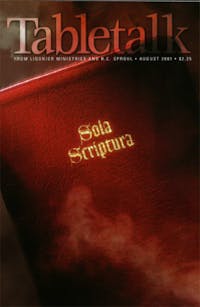
Request your free, three-month trial to Tabletalk magazine. You’ll receive the print issue monthly and gain immediate digital access to decades of archives. This trial is risk-free. No credit card required.
Try Tabletalk NowAlready receive Tabletalk magazine every month?
Verify your email address to gain unlimited access.
The Bible puts a premium on the “tradition” that is passed from generation to generation—not the traditions of men, but the divine tradition transmitted by prophets and apostles. The word tradition itself, which means “to give along,” hints at the idea that the divine tradition is in large measure a divine gift. For unlike Tavye’s cherished tradition, which helped keep the fiddler on the roof from falling off his precarious perch, this tradition is grounded in the authority of God Himself.
Yet in addition to the prophetic and apostolic tradition inscripturated in the Bible, there exists also a wealth of Christian tradition that extends from the closing of the canon of Scripture to the present. What role does this tradition have in the lives of Christians? What authority does it exercise on and in the church?
The issue of Scripture and tradition was seen as the “formal cause” of the Protestant Reformation. In debating his views on justification at Leipzig and Marburg, Martin Luther was maneuvered by his able antagonists, Eck and Cardinal Cajetan, to acknowledge that his views clashed with teachings set forth in church councils and by the church fathers. Perhaps even more serious was Luther’s contention that popes could and had erred in their teaching. (Although papal infallibility was not officially declared until 1870, it enjoyed a wide acceptance for centuries before that.) Luther argued that popes and councils could err and thus fell short of the supreme authority of Scripture, which, Luther declared, “does never err.”
This principle of the sole inerrant authority of the Bible was set in concrete at the Diet of Worms, where Luther is said to have declared: “Unless I am convinced by sacred Scripture, or by evident reason, I will not recant. My conscience is held captive by the Word of God, and to act against conscience is neither right nor safe.… Here I stand.”
In the Roman Church’s response to the Reformation, it set forth its view of Scripture and tradition at the Fourth Session of the Council of Trent, declaring:
These truths and rules are contained in the written books and in the unwritten traditions which, received by the apostles from the mouth of Christ Himself, or from the apostles themselves, the Holy Ghost dictating, have come down to us.… Following, then, the examples of the orthodox Fathers, the church receives and venerates … all the books both of the Old and New Testaments, since one God is author of both; also the traditions, whether they relate to faith or to morals, as having been dictated either orally by Christ or by the Holy Ghost, and preserved in the Catholic Church.
There is a certain ambiguity in this passage. It speaks simply of Scripture and tradition. Does this mean simply that what God reveals in Scripture also can be found in the later traditions of the church? Or does it mean that, in addition to the revealed truth in Scripture, the Holy Spirit adds more revelation in the tradition?
As a Protestant, I believe that much of the truth of Scripture can also be found in the creeds and confessions of the church and in the teachings of the great theologians of church history. I have enormous respect for that tradition. But I stop short of saying that it is inspired by the Holy Spirit. These traditions lack the authority that is found uniquely in Scripture.
The issue of Trent’s intent was clarified somewhat in the twentieth century when an Anglican scholar discovered a remote source that uncovered the first draft of the Fourth Session. In that draft, the council declared that the truth of God was found “partly” (partim) in Scripture and “partly” in tradition. This would have removed any ambiguity and made it clear that Rome officially taught a “dual source” of special revelation, the Bible and church tradition. But when that draft was presented to the council, two delegates protested that the wording would undermine the uniqueness and sufficiency of Scripture. Unfortunately, the record ends there. In the final draft, the words “partly” (partim … partim) were removed and replaced by the simple word “and” (et).
Why the change? Did the council heed the warning of the delegates? Was the change merely stylistic? Was it left intentionally ambiguous? We don’t know. But what is ambiguous at Trent is cleared up by later papal encyclicals (such as Humani Generis), in which the dual-source theory was declared.
This is why sola Scriptura remains a terminal point of division between Roman Catholicism and Protestantism. This is why we must continue, in spite of pressure otherwise, to trust in God’s Word as our only rule of faith and practice.
